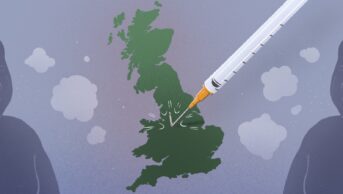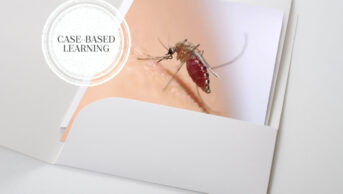
CFF
Josélia Frade is director of professional development of the Pharmaceutical Forum of the Americas, an organisation that brings together national pharmaceutical associations, the Pan-American Health Organization and the International Pharmaceutical Federation, and aims to advance pharmacy practice in the region. She is also adviser on professional matters to the president of the Federal Council of Pharmacy of Brazil, the regulator that represents Brazil’s nearly 200,000 pharmacists.
Brazil is the most affected country in the current Zika virus outbreak. How has the outbreak been evolving across the region?
We have been experiencing a worrying situation concerning the spread of the disease since April 2015, when the first case was confirmed. The latest epidemiological bulletin of the Brazilian Ministry of Health (MoH) indicated that nearly all states of Brazil now have laboratory confirmed cases. In addition, the virus has spread throughout the continent, with cases documented in several countries across the region, including Colombia and Bolivia.
On 18 November 2015, the MoH declared a state of public health emergency of national importance, a situation that had been adopted only once before, in 1917, with an outbreak of the Spanish flu.
The possible correlation between the infection and the incidence of microcephaly is a serious issue and it has been alarming health authorities across Latin America. From October 2015 to January 2016, there have been more than 3,500 suspected cases reported in Brazil among newborns from 684 cities in 21 states. Analysis of four of these cases showed that the babies were infected during pregnancy when the Zika virus reached their nervous system. Two of these cases ended in miscarriages and the other two died shortly after birth.
What sort of queries have people been asking about in pharmacies?
There is a great deal of concern among the population. There have been many queries in pharmacies about preventive measures (e.g. which repellents should be used by pregnant women and children, or for how long are repellents effective?) and about the diagnosis and treatment of symptoms and signs of the virus.
How have Brazilian health authorities been reacting to the epidemic?
There have been individual initiatives from different health authorities. The epidemiological surveillance of the suspected cases, carried out by the MoH, made it possible to establish a correlation between the Zika virus infection and microcephaly. There are also online training modules aimed at preparing healthcare professionals to identify, notify and treat conditions transmitted by the Aedes aegypti mosquitoes. A communication channel was established to fight the insect and an app was developed to map where mosquitoes have been found in order to help individuals notify this information to health authorities.
A critical point in the management of infections is the suspected diagnosis. Therefore, there are also considerable investments on the development and application of quicker diagnostic tools. Likewise, the MoH is providing funding and regulatory support to research projects related to Zika.
However, there have also been critical voices that questioned the vector control model used by the MoH. The Brazilian Association of Collective Health (Abrasco) — an organisation formed mainly by universities and academics that advocates for public health policies — argues that this model is largely based on the strategies that have been used to fight dengue fever for 40 years with questionable efficacy. Abrasco’s criticism has also targeted the lack of coordination between epidemiological surveillance, urban and sanitary planning policies and health promotion strategies. Likewise, it has questioned the use of certain chemical agents to control mosquitoes because of concerns about their effects on humans.
What is the Federal Council of Pharmacy of Brazil and other professional pharmacy organisations in the region, such as the Pharmaceutical Forum of the Americas, doing in response to the Zika virus outbreak?
The Federal Council of Pharmacy of Brazil is providing reliable information to pharmacists across Brazil. We have established a task force that is producing scientific and professional resources for healthcare professionals and patients. We have also published a brochure directed to pharmacists, containing the basic facts related to the identification of differential signs and symptoms of dengue, Zika and chikungunya, preventive measures, and symptomatic management of diagnosed cases. A similar leaflet was developed for patients.
We have also put together a library on our website containing documents on the management of those conditions published by different organisations.
We are designing a protocol for clinical practice aimed at dengue, Zika and chikungunya, which will help pharmacists select the best response according to the needs of the patient.
In the Pharmaceutical Forum of the Americas, we are compiling guidelines and other documents produced by the members of the forum (national pharmacist organisations) that may be shared with other countries through online platforms. We are also considering a joint project between the forum and the Pan-American Health Organization.
What roles are pharmacists in Brazil playing in the management of this outbreak?
We see pharmacists as being well placed to educate and offer guidance to the population, offering reliable information about the transmission, signs, symptoms, diagnosis, the need for compulsory notification, clinical evolution and possible complications of the disease. We may also offer counselling and practical measures to prevent the disease and manage its symptoms.
Some inaccurate information has been circulated and broadcasted by the media, including speculations about the cause of microcephaly (e.g. there are unfounded claims that the larvicides used to control the mosquito population are linked to microcephaly), and this information could cause panic in the population. As trustworthy healthcare professionals, pharmacists can have a major role in dispelling myths and inaccurate information.
How could knowledge about dengue and chikungunya be used to understand and fight Zika?
Dengue and chikungunya are also viral diseases transmitted by arthropods, such as the Aedes aegypti, which live in Brazil. Our experience with these diseases has helped in the planning and establishment of control strategies through sanitary and public health measures. Our fight against Aedes mosquitoes is an old one and knowing your enemy is an advantage in the battlefield.
Recently, Brazilian researchers have identified the Zika virus in the saliva and urine of patients. Likewise, the possibility of sexual transmission has been shown. This could pose a greater risk of spreading the disease and would require reconsideration of the prevention strategies, currently focused on the control of mosquitoes. What advice should pharmacists give?
There is insufficient evidence to prove that the presence of the virus in these fluids can infect others. This will require further study in order to better understand the life cycle of the virus in the human body. For example, we still do not know the virus survival time in these body fluids, or if it has the same infection capacity after passing through gastric acid.
The guidance in terms of vector control and the use of repellents remains in force. However, new cautionary measures need to be advised, such as avoiding sharing personal items (toothbrushes and cups, for example) and washing hands frequently. It is essential to remember that infected patients should also follow these precautions to prevent further spreading the infection.


